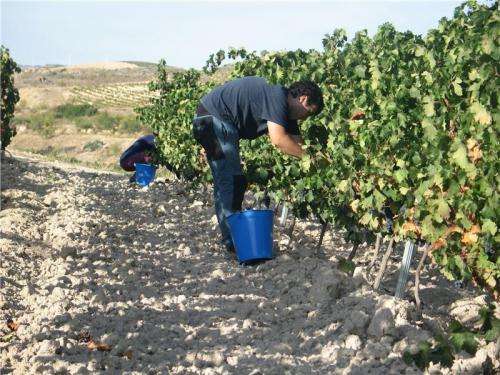Researchers study the effects of climate change on Tempranillo grape wines

Climate change is set to affect the quality of the wines of the Tempranillo grape variety, according to the conclusions of a piece of research conducted by the Basque Institute for Agricultural Research and Development Neiker-Tecnalia, in collaboration with the University of Navarre and the Aula Dei (EEAD) Experimental Station of the National Council for Scientific Research (CSIC). Scientists from these bodies have studied the behaviour of the vines in conditions of climate change; in other words, higher temperature, increased presence of CO2 and greater environmental aridity. The result is a must with a lower anthocyanin content, which leads to wines with less colour and therefore lower quality. The results of the research, led by the agricultural engineer Urtzi Leibar, have been presented at the conference of the European Geosciences Union (EGU), held in Vienna (Austria).
The research has been conducted in a greenhouse environment with vines of the species 'Vitis vinifera cv. Tempranillo'. The three factors studied were climate change, water stress of the plant and soil texture. To analyse the effect of climate change on the grapes, some vines were placed in conditions of a greater presence of CO2, higher temperature and lower relative humidity, while other vines were situated in current climate conditions.
In addition to the CO2 and temperature changes, climate change is expected to cause a reduction in rainfall, with this rainfall being distributed across more extreme events. That is why the researchers subjected the vines to two different treatments. One with properly hydrated plants (20-35% of water content in the soil) and the other treatment consisted of plants subjected to water stress, and which were irrigated with 40% less water. As regards the soil, three different textures were studied with clay contents of 9%, 18% and 36%.
Among the most significant results as regards production and qualitative parameters, climate change was found to bring forward the grape harvest by nine days. This reduced the anthocyanin concentration, which resulted in red wines with less colour. It also caused an increase in the pH of the must. The pH level is a factor of interest for wineries, since it has to be low if the wines are going to be preserved optimally.
The water shortfall, for its part, delayed ripening –the grape harvest was carried out ten days later– and the growth of the vine was reduced. This fact also meant an increase in the pH of the must and a reduction in polyphenol content. Polyphenols are found in grape skin and pips and give wines aroma, colour and taste. As regards soils, the sandiest ones –with the lowest clay content– produced musts with a higher anthocyanin level, which yields wines with more colour.
Information of interest for the wine growing sector
The final aim of the study by Neiker-Tecnalia, the University of Navarre and the EEAD-CSIC is to make available information that will assist the wine growing sector in mitigating possible damage by the anticipated climate conditions or, where appropriate, to take advantage of the opportunities that may present themselves.
The climate is the factor that exerts the greatest influence on the suitability of a region for vine growing and wine production, since it directly affects the development of the vineyard and grape quality. Climate change is therefore an aspect that the sector needs to take very much into consideration.
The vineyard surface area across Spain amounts to 954,000 hectares, which is 5.6% of the total cultivated surface. The wine growing sector is an hugely important activity in terms of the economic value it generates, the population it employs and the role it plays in environmental conservation.
Provided by Elhuyar Fundazioa



















